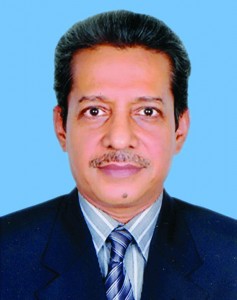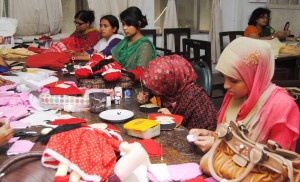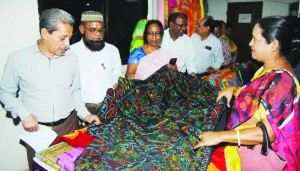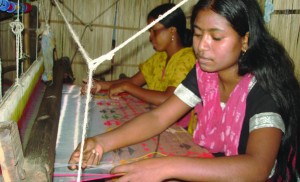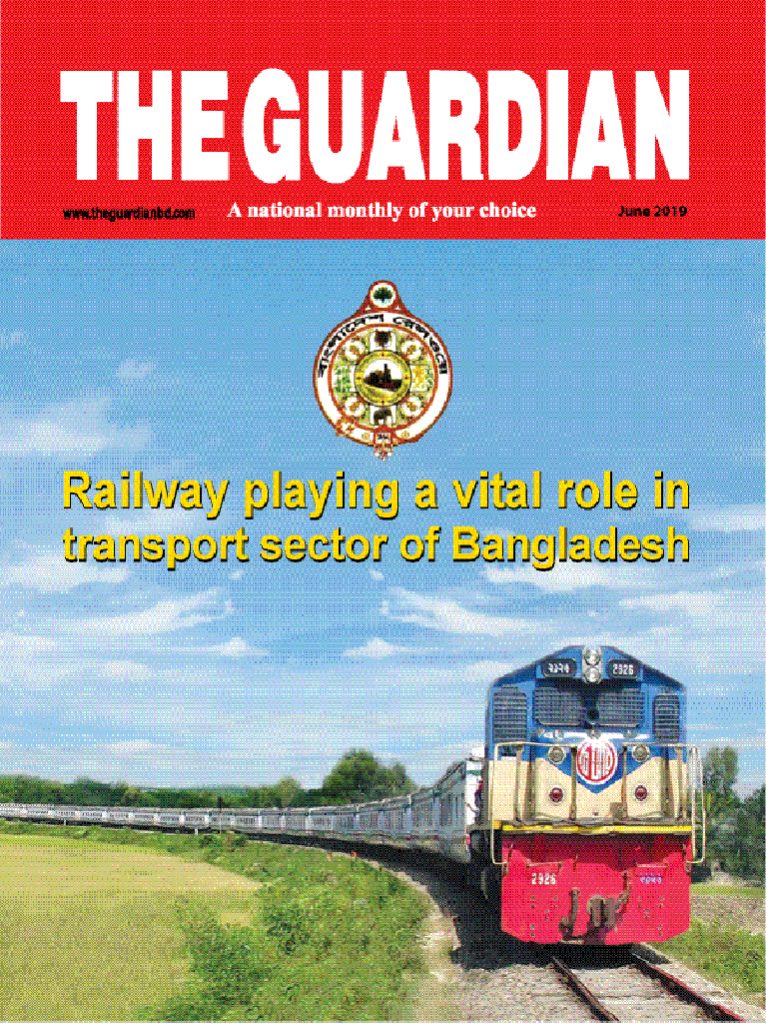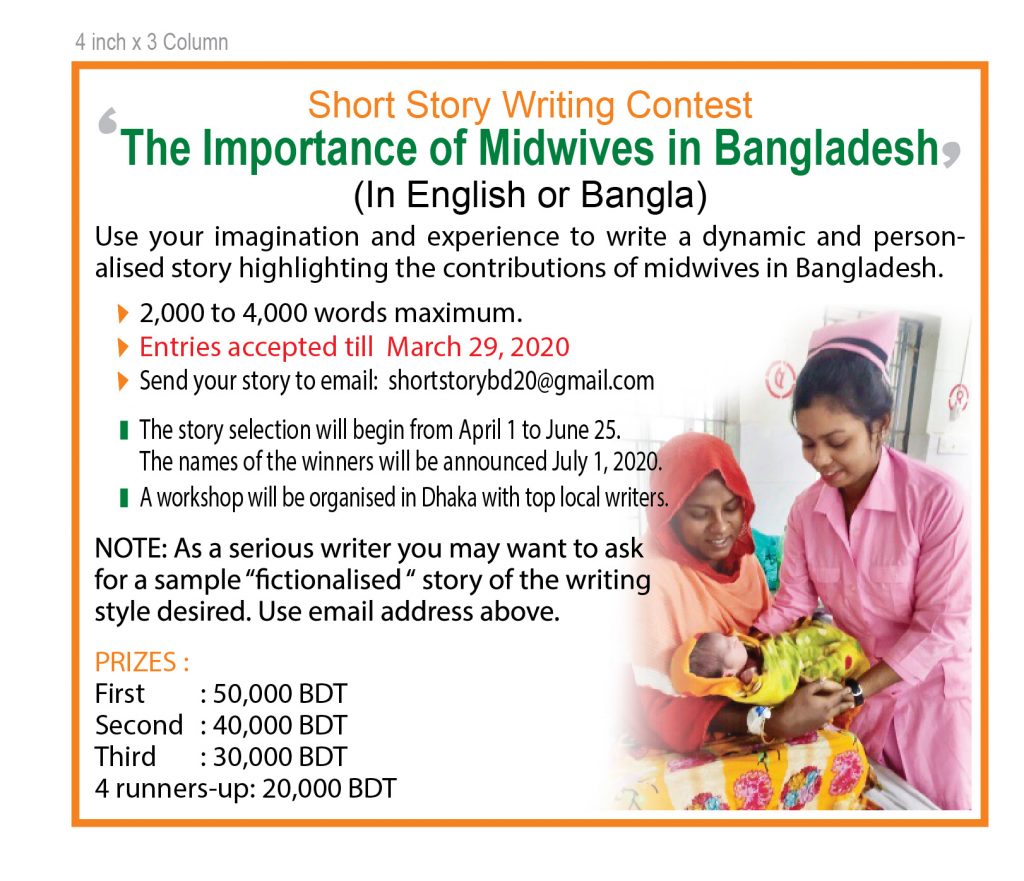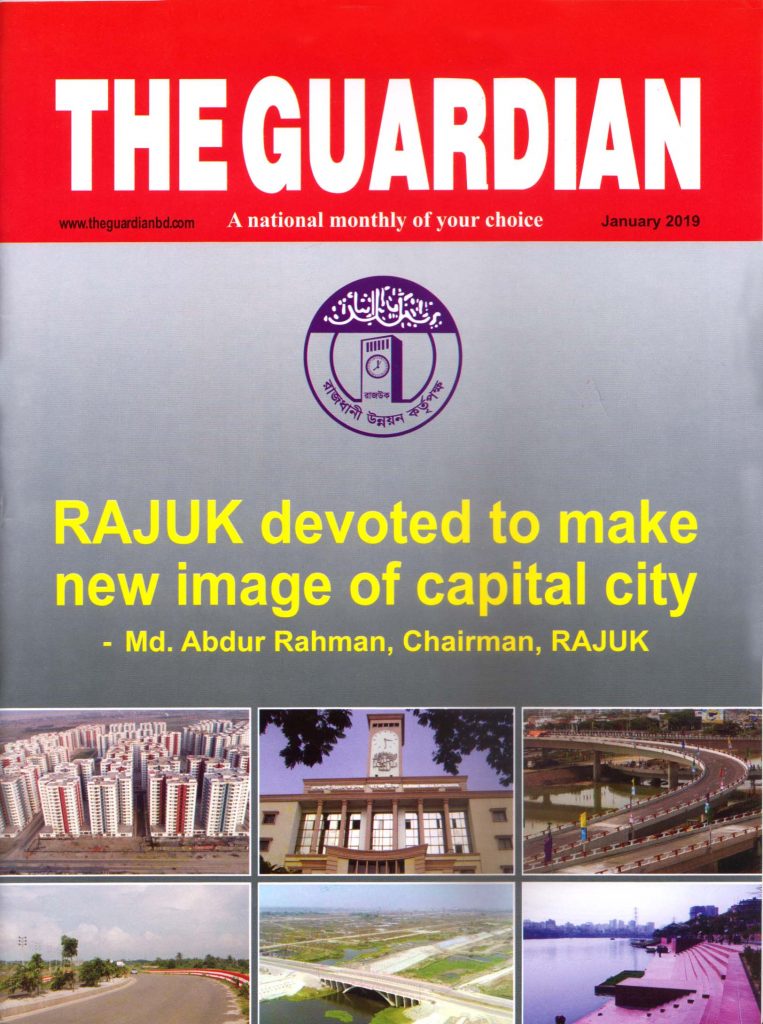-Interview by Mostafa Kamal
Bangladesh Small & Cottage Industries Corpo-ration (BSCIC) has been playing a pioneering role in (laying the foundation of) industrialization of Bangladesh through transforming the agrarian mindset of our people into a more industrial mindset since 1957, said Mustak Hassan Md Iftekhar, Chairman of BSCIC and Additional Secretary to the Government of Bangladesh, in an exclusive interview with The Guardian.
Terming BSCIC as the prime mover in Bangladesh to support industrialization process through the creation of an entrepreneurial society, the Chairman informed that the Father of the Nation Bangabandhu Sheikh Mujibur Rahman laid the foundation of BSCIC by placing the Bill in the Provincial Assembly of then East Pakistan Government in 1957. BSCIC has also played important role in the development of large-scale industries beside the development of small, medium and cottage industries in our country.
In this context, he added that many small and cottage industries in our country have been established with the support from BSCIC and now-a-days a good number of public and private organizations including financial institutions have been providing concerted support to the entrepreneuers in this regard.
Since its establishment in 1957, BSCIC has long commitment to put its effort for implementing government decisions and agenda for the interest of the country under the policy guidance of the Ministry of Industries.
He then added that BSCIC is also contributing to the efforts of Hon’ble Prime Minister Sheikh Hasina’s Vision 2021 to build a Digital Bangladesh by enhancing its capacity building through ICT integration and, accordingly, BSCIC has been developing ICT infrastructure and software to deliver services quickly to the entrepreneurs for the interest of SMCI sector.
In reply to a question, the Chairman mentioned that at the time of establishment of BSCIC in 1957, the contribution of the industrial sector in the GDP was very negligible. Now it has reached at an enviable position by contributing 3.71% in the GDP. He also mentioned that besides developing the small and cottage industries sector, BSCIC has been playing a significant role in creating job opportunities for innumerable people towards solving unemployment problem of this densely populated country.
In reply to another question, the Chairman said that BSCIC has been playing an important role in poverty alleviation apart from producing by skilled and semi-skilled manpower in the Skills Development Training Centres (SDTCs) and Design Centre of BSCIC. It is also developing entrepreneurs in the Small & Cottage Industries Training Institute (SCITI).
In spite of its remarkable contributions to initiate industrial development vis-à-vis socioeconomic development of Bangladesh, the Chairman also observed that BSCIC has been suffering from institutional weaknesses that need to be addressed soon. He informed that with the abolition of the previous Directorate of Industries in 1986, BSCIC has to share many of the responsibilities of defunct directorate without enhancing its capacity.
On the other hand, necessary rules and regulations have not been prepared following the Act 1957 to develop and protect SME and making it a more vibrant organization. Modernizing BSCIC to meet high expectations of the entrepreneurs and challenges due to globalization is a big task that warrants commitment of all and leadership from within the organization. Presently, the Act 1957 is under revision and it is hoped that the revision will bring some changes to make BSCIC and the SME sectormore vibrant.
In this exclusive interview, the Chairman replied to several questions covering the entire activities, problems, potentials, contributions and future plans of BSCIC, including the overall scenario of SMCI sector and its contribution to the national economy of Bangladesh. His deliberations are quite outstanding, informative, educative and interesting as well. The excerpts of his interview are presented here below for The Guardian readers at home and abroad.
The Guardian: Please give us a brief founding history of Bangladesh Small and Cottage Industries Corporation (BSCIC).
Chairman: Bangladesh Small & Cottage Industries Corporation (BSCIC) is an autonomous organization. It is the successor of the then East Pakistan Small & Cottage Industries Corporation (EPSCIC) established by an Act of the Parliament in 1957. Importantly, the Bill was placed by Bangabandhu Sheikh Mujibur Rahman, the Father of the Nation, as the Minister for Commerce & Industries of then East Pakistan in 1957. It is the prime sponsoring agency for the small, micro & cottage industries (SMCI) sub-sector.
The Guardian: In this context, would you give us a brief idea about definition and classification of industrial enterprises like ‘small’, ‘micro’ and ‘cottage’ industry?
Chairman: The Industrial Policy 2016 provides definitions. For manufacturing sector, ‘small industry’ will be deemed to comprise enterprises with either the value (replacement cost) of fixed assets excluding land and building between Tk. 5 million and Tk. 100 million, or with between 25 and 99 workers. For service sector, ‘small industry’ will correspond to enterprises with either the value (replacement cost) of fixed assets excluding land and building between Tk. half a million and Tk. 10 million, or with between 10 and 25 workers.
If on one criterion, a firm falls into the ‘small’ category, while it falls into ‘small’ category based on the other criterion, the firm will be deemed as in the ‘small’ category.
For manufacturing sector, ‘micro industry’ will be deemed to comprise enterprises with either the value (replacement cost) of fixed assets excluding land and building between Tk. half a million and Tk. 5 million, or with between 10 and 24, or smaller number of workers. For service sector, ‘micro industry’ will be deemed to comprise enterprises with either the value (replacement cost) of fixed assets excluding land and building of less than Tk. half a million, or with up to 10 workers, including household members.
If on one criterion, a firm falls into the ‘micro’ category, while it falls into ‘micro’ category based on the other criterion, the firm will be deemed as in the ‘micro’ category.
If on one criterion, a firm falls into the ‘cottage’ category, while it falls into “cottage” category based on the other criterion, the firm will be deemed as in the ‘cottage’ category.
The Guardian: Would you briefly tell the objectives of BSCIC?
Chairman: BSCIC is the only patron of the small and cottage industries and handicraft industries of the country. The Act 1957 stated the following objectives:
1. To alleviate poverty by creating employment opportunities.
2. To ensure balanced regional growth.
3. To increase production of the existing Small and Cottage Industrial units.
The Guardian: Would you focus on the services and activities currently rendered by BSCIC?
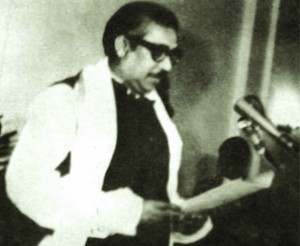
Bangabandhu Sheikh Mujibur Rahman, Father of the Nation, as the Minister for Commerce & Industries of the Provincial Government of then East Pakistan is placing the Bill in the Provincial Assembly in 1957 for East Pakistan Small & Cottage Industries Corporation (EPSCIC), presently BSCIC.
Chairman: BSCIC has a wide range of services and activities. With the progress in industrialization and demand of the time, it has dropped some of the activities and included many more. All its services and activities surround the artisans, the entrepreneurs and the industry owners. Some of the current services and activities are as follows:
1. Counseling and scouting entrepreneurs for entrepreneurship development.
2. Pre and post investment counseling to the entrepreneurs.
3. Registration of small, micro, cottage and medium industrial units across the country.
4. Credit facilitation to the entrepreneurs from various sources such as banks and financial institutions.
5. Preparation of Project Profiles for the entrepreneurs and project appraisal proposals for the financial institutions.
6. Providing technical and consultancy services for establishing new industrial units and quality improvement of SMCI products.
7. Development and distribution of new designs and prototype.
8. Innovation, collection, adaptation and distribution of technology in the SMCI sector.
9. Recommendation for exemption of duties and taxes.
10. Recommendation for import entitlement of raw materials and packaging materials.
11. Honey cultivation and extension services, supply of improved variety of bee colonies, beehives to the honey-farmers.
12. Agglomeration of small, micro and medium industries by establishing Industrial Estates and providing infrastructural facilities.
13. Salt production and extension services.
14. Procurement and supply of Potassium Iodate to the salt millers and monitoring of their iodized salt production.
15. Entrepreneurship Development Training including management development and skills development.
16. Research and development.
17. Credit arrangement/assistance.
18. Buyer-Sellers Meeting towards marketing and product introduction.
19. Establishment of Sub-Contracting linkage.
20. Marketing of SME products.
21. Implementation of suitable projects.
The Guardian: Keeping this in view, would you give us a complete picture of the organizational structure of BSCIC, showing the present organogram of BSCIC?
Chairman: BSCIC is a statutory and autonomous organization. To run the organization there is a Board of Directors consisting of 7 Directors with the Chairman as CEO. It has six Divisions and a Secretariat. Secretary of BSCIC acts as its Secretary. The divisions are: i. Finance & Audit, ii. Promotion and Extension, iii. Planning and Development, iv. Project, v. Marketing and Design and vi. Technology.
BSCIC has countrywide establishments run by 2410 workforce. It has 4 regional offices; 64 district offices named as Industrial Services Centers; 15 Skills Development Training Centres; 76 Industrial Estates and a Design Centre in the HQ. Apart from these, it has 27 Development &Training Centres and 3 Cottage Industries Development Program Offices in the Hill Tracts Districts. It has also a dedicated office for salt prodction and development in Cox’s Bazaar and six bee breeding/multiplication centres in six districts. For the entrepreneur development, BSCIC has Small & Cottage Industries Training Institute (SCITI) located in Uttara, Dhaka.

Prime Minister Sheikh Hasina, accompanied by Finance Minister Shah AMS Kibria and other high officials of the Government and BSCIC, is visiting BSCIC Pavilion in Dhaka International Trade Fair in 2001.
The Guardian: So far it is learnt that as a single national organization for the SMCI sector, BSCIC is involved in creating infrastructural facilities around the country for promoting and extension of small, micro, medium and cottage industries. Would you inform us about the total number of industrial estates already created by the BSCIC and also say what role the BSCIC has been playing in providing electricity, gas, water, telecommunication and physical infrastructure development like buildings, roads etc. at all those estates?
Chairman: Well, on behalf of the Ministry of Industries, BSCIC has developed industrial estates in phases. Presently, the total number of industrial estates is seventy-six (76). To be explicit, BSCIC, financing through Annual Develo-pment Programme (ADP), acquires land, develops plots and infrastructure such as road, drain and culvert. It also ensures supplies of electricity, telecommunication, gas and water for the industry owners. The whole estate is divided into 5 types of plots and thus gets ready for allotment.
The Guardian: Would you inform us to whom these estates are allotted and what terms and conditions the allottees are to fulfil in getting allotments?
Chairman: Those ready plots are allotted to potential entrepreneurs by the District Plot Allocation Committee, headed by the Deputy Commissioner. Representatives from FBCCI, NASCIB, Titas Gas, BTTB, DPHE, PDB and REB are also member of the committee. BSCIC advertises for plot allotment in the daily newspaper. The allotment procedure is stated in BSCIC Plot Allotment Policy in details. Moreover, in each case of plot allotment a prospectus is distributed.
In getting allotment the entrepreneurs have to fill up specific forms along with the following papers mentioned in the check list. The required papers are: (a) 4 copies of passport size photos, (b) 4 copies of duly filled in forms, (c) nationality certificates of entrepreneur, (d) trade license, (e) feasibility report of the proposed project, (f) bank solvency certificate, (g) quotation of machineries, (h) lay-out plan of machineries, (i) building layout-plan, (j) papers related to finance, (k) implementation schedule.
A committee of BSCIC scrutinizes all proposals and places before the District Plot Allotment Committee. Among the proposals, those are found feasible are finally selected for plot allotment.
The Guardian: It is learnt that the BSCIC has some specialized industrial Estates like Jamdani and hosiery estates. Would you please inform us about all those types of special industrial estates and also inform us about the progress of those?
Chairman: There are three (3) monotype industrial estates. Those are the Jamdani Industrial Estate and Research Centre, Hosiery Industrial Estate, and Electronics Complex. Jamdani and Hosiery industrial estates are located at Narayangonj district and the Electronics Complex is located in Mirpur, Dhaka. Four more industrial estates are under construction. Those are Active Pharmaceuticals Ingredients (API) Industrial Park in Gazipur, Munshiganj, Tannery Industrial Estate at Savar, Plastic Industrial Estate, Barabartha, Serajdikhan, Munshiganj and Printing Industrial Estate, Serajdikahn at Munshiganj.
The objectives of establishing monotype estates are to boost-up a potential sub-sector. The plots in hosiery estate and in Jamdani estate have already been allotted. In the electronics complex all spaces are already rented out to electronic industries. Plots in API have been recently allotted. Plots in Tannery estate have been alloted long time ago. More than one hundred tanneries are in operation. On the otherhand, land acquisation process is under way for Plastic and Printing Industrial estates.

Annual Conference of BSCIC 2018: Seen on the podium from the the left are Director (Joint Secretary) of BSCIC Jibon Kumar Chowdhury, Secretary of the Ministry of Industries Mohammad Abdullah, Minister for Industries Amir Hossain Amu, MP , Chairman of BSCIC Mustak Hassan Md Iftekhar and Additional Secretary of the Ministry of Industries Ms Porag.
The Guardian: Would you please give your reaction to the allegation that the appropriate applicants always do not get allotments of BSCIC plots, rather in close collaboration with the corrupt officials of BSCIC, inappropriate persons get the maximum allotments?
Chairman: Well, I do not agree. Appropriate applicants always get allotment since there is a fair selection procedure as I told you earlier. All the applicants are the entrepreneurs who always hope and look forward. Getting industrial plots and running an industry or factory are two different issues. Some of the allottees may fail to mobilize resources in time, some cannot analyze market and some may have ill motives. As a result, few of the plots fall vacant and some industries fall sick. However, there is room for possible corruption. To arrest the corruption, it needs to improve the present system and be strict about the compliances during the allotment stages and the aftermath.
The Guardian: Would you please give us some insights on the BSCIC industrial estate approaches and their contributions to national economy?
Chairman: Thanks indeed. You know Bangabandhu Sheikh Mujibur Rahman, Father of the Nation, was well informed of the economic and social disparity of then East Pakistan (now Bangladesh). Due to his initiative, then EPSIC (now BSCIC) came into existence. And in absence of any planned industrialization approach, the BSCIC industrial estate development approach was the first of its kind. The approach worked well.
Initially, 20 industrial estates were built until 1980. The strategy of providing all supports such as roads, culverts, electricity, gas and water, attracted the entrepreneurs. The government found the approach still effective for SME sector. Industries are agglomerated, service providing agencies found convincing to provide services in one place for many; environment could be better protected; subsidized price of land and repayment by installments; supervision by the government agency; confidence of the financing institutions; better communication are some of the benefits of this approach.

Baishakhi Fair 1425 (Bangla) organized by BSCIC: Minister for Industries Amir Hossain Amu, MP (middle) as chief guest inaugurates the fair. Additional Secretary of the Ministry of Industries Md Enamul Haque and Secretary of the Ministry of Cultural Affairs Nasir Uddin Ahmed and Director General of Bangla Academy Professor Shamsuzzaman Khan (extreme right) attend as special guests. Chairman of BSCIC Mustak Hassan Md Iftekhar presides over the function.
The strategy of setting estates in all districts and at the upazila level ensures balanced economic growth and growth of third economy as trickledown effect. As of now, BSCIC has seventy-six (76) industrial estates. There are 10598 numbers of plots in all 76 industrial estates. Of it, 10158 plots have been allocated to 5840 industrial units.
However, four thousand five hundred and eighty-nine (4589) industrial units are constructed and in operation. Currently, 90 industrial units are under construction. Nine hundred and forty-six (946) industrial units are export oriented. A rough estimate shows that until now, the units have invested about Tk. 20178.17 crore. Huge number of employment has been created in those estates and it amounts to 55262.26 (until 2016-17). The share of export is 9.21% of the year. Government earned revenue Tk. 3584.85 crore in the year (2016-17).
The Guardian: It is also learnt that BSCIC has a number of centres and training institutes to provide different kinds of training to entrepreneurs, BSCIC staffs as well as the interested people across the country. Would you tell us about this in detail?
Chairman: BSCIC provides training through Small & Cottage Industries Training Institute (SCITI), Industrial Service Centres (ISC), Design Centre, Skills Development Training Centres (SDTC) and Hill Distract SCI Program Centres to entrepreneurs, artisans and workers with a view to produce skilled manpower and improve their skills. Those are mainly on management, handicrafts and design and trade based skills development.These institutions and centres are spread over the country. Information related to training programs are as follows:

Secretary of the Ministry of Industries Mohammad Abdullah is visiting a Stall at Honey Fair organized by BSCIC. Chairman of BSCIC Mustak Hassan Md Iftekhar and other high officials of BSCIC are accompanying the Secretary.
Design Centre: A well-equipped Design Centre in the Headquarters at Motijheel in Dhaka develops, collects and supplies various designs to the entrepreneurs and artisans. They are given trainings on various trades such as block and boutique printing, dolls making, leather goods, pottery, cane and bamboo, metal works, wood works, jute and textile weaving, handicrafts, packaging, screen printing and tapestry. Students of universities and various institutions do their internship/attachment in the Design Centre.
Small & Cottage Industries Training Institute (SCITI): It imparts entrepreneurship development training who want to start business and who are already in business. This Institute is situated at Uttara in Dhaka city with residential accommodation in its own campus. The six faculties provide training on Entrepreneurship Development, Industrial Management, Financial Management, Marketing Manage-ment and General Management. Apart from providing training, the Institute also conducts research work and provides consultancy.
Skill Development Training Centre (SDTC): To enhance skills of less educated work force both men and women, BSCIC has 15 SDTCs in fourteen districts. Those centres provide training on various technical trades such as: electrical house wiring and motor winding, refrigerator and AC repairing, radio and TV repairing, garments and machine knitting, fitting-cum-machine shop practices, welding, word processing, mobile phone repairing, cutting and sewing and food processing.
Hill District SCI Program: This is a unique type of program introduced in Rangamati, Khagrachari and Bandarban Hill Districts to impart skills targeting distressed people. Raw materials and equipment are given to them in a group under credit fund but interest free. Simultaneously, they are given training on various trades. The loan is contingent upon trade-based training. The trades are weaving, wood works, dress making, cane and bamboo, block and boutique printing, knitting, computer, electrical house wiring, food processing, radio and TV repairing, machine repairing, embroidery and tapestry, fruit processing and bee keeping.
The Guardian: Would you inform us about the number of development projects are being implemented by BSCIC under ADP at present?
Chairman: Presently, BSCIC has been implementing 26 projects under the annual development program funded by the Government of Bangladesh except two. These 26 projects are located in 17 districts. The BSCIC Industrial Park, Sirajganj is the biggest one by size. It has 400 acres of land. The objectives of these projects are: balanced regional development, agglomeration of industries, facilitating SME sector, entrepreneurship and skills development, developing new products such as honey and salt and poverty alleviation through industrialization.
The Guardian: Would you tell us something about the poverty alleviation programmes of BSCIC?
Chairman: Well, BSCIC aims at poverty alleviation through supporting artisans and entrepreneurs through training and credit facility; providing trade based training as mentioned earlier, linking them with the financial institutions. The other initiative is employment creation through establishing new industrial estates. It is worth mentioning that four completed projects of BSCIC have been turned into a foundation named as SMCI Foundation, dedicated to provide training and credit facility at rural levels. BSCIC facilitated self-employment to 9655 numbers of people and generated 18,800 numbers of employments.
With a sizable amount of endowment fund, BSCIC runs its regular credit program throughout the country. The total number of beneficiary till date is 214615. BSCIC also acts as intermediary organization to facilitate loan to the trained and developed entrepreneurs through appraising clients’ project profile and evaluating their loan proposals. Banks always value BSCIC’s recommendations. It is plausible to mention that a tertiary economy has developed surrounding the industrial estates and parks that supported another group to reduce poverty.
The Guardian: Would you focus on how BSCIC is supporting cottage industries towards the socioeconomic development of Bangladesh?
Chairman: Well, from time immemorial, rural families have been running cottage-based industries such as pottery, boutique and tapestry, metals, handicrafts, bamboo and cane and weaving. BSCIC is the pioneer in supporting cottage industries in rural setting. BSCIC has registered 295340 cottage industries. Once they are registered, BSCIC and other organizations provide various types of training and loans. Until now, BSCIC has provided 2 types of training: i. entrepreneurship development training and ii. skill development training to 128484 numbers of artisans. BSCIC also develops design and distributes those to the artisans and entrepreneurs. BSCIC has developed and collected 33000 types of designs and distributed to them. BSCIC arranges a good number of fair across the country where local artisans display and market their products.
BSCIC also conducts periodical survey on the small and cottage industries. According to a survey conducted by BSCIC in 1962, there were 16,331 small industries and 2,34,934 cottage industries in the country. It increased to 24,005 and 3, 21,745 in 1978-80 and further to 38,294 and 4,05,478 (excluding handloom) in 1985-89 respectively. It further increased to 1,17,665 and 6,53,769 in June 2015 respectively. The statistics tells that rural people have changed their mindset towards industrialization through self-employment and handicrafts are getting popular at home and abroad.
This has also generated employment at the grassroots levels. We have found that women folk is more involved in the cottage industries enabling them socially empowered and decision making. Thus, cottage industries also play effective role in revitalizing the rural economy. At present cottage industries contribute 3.8% in the GDP of Bangladesh. I agree this support is not enough and not much planned. The Ministry of Industries has instructed to develop a project to revitalize and support handicrafts and artisans. We are developing the proposal. This will be the first planned project of its kind in Bangladesh.
The Guardian: Would you say whether there is any scope to set up cottage industries in the rural areas in joint-collaboration with the NGOs?
Chairman: Well, until now, BSCIC has been working stand alone. We haven’t explored much in the past about the joint collaboration with NGOs. However, I think there is no bar. This is an opportunity horizon to explore. Recently, Ministry of Industries has taken up a project named Poverty Reduction Through Integrated and Sustainable Markets (PRISM) co-funded by EU. Under this project 5 NGOs have been supported for these purposes. I think this may be a good platform to explore joint venture in future. We’ll keep such provision in the upcoming Handicraft Development Project.
The Guardian: Would you inform us how far the BSCIC has been able to involve the women for women Entrepreneurship Development Program?
Chairman: Well, this is really an importan issue. You will be surprised to know that BSCIC is the first organization who initiated planned program to develop women entrepreneurship in the country back in 1981. The Ministry of Industries with the assistance of USAID undertook the Women Entrepreneurship Development Programme (WEDP) executed by the BSCIC. The program was implemented in 50 Upazillas. Later on, the governmentfounded the program. The program continued till 2002 and transferred in the revenue budget of the BSCIC.
WEDP was a women run and predominantly women staffed program of the government. About 124852 women had given credit for running business after they were given entrepreneurship training for 03 days. The IMED evaluation report found that the program an effective one. The program is still continuing but with a different setting. All the 64 ISCs (district offices) run this program for 3 days and the participants are of both sexes. Each ISC has a target. SCIT also provides entrepreneurship training to women some time it is mixed with men and some time for only women.The program is of 5 days duration. The difference is that BSCIC could not provide with loan after imparting trainig due fund scarcity. Now it is felt that such a program needs to be undertaken again.
The Guardian: Keeping this in view, would you also say a few words on the activities of BSCIC in the changed global context?
Chairman: The world has been changing very frist so is the country. The survival philosopy demands that one should adapt with the changes. Otherwise, it may lose its importance. The globalization policy has changed almost everything rapidly. The market is open and very competitive; resource moves across the frontier; industries need to attain compliances; products need branding; local industries are competing with multi-national companies, and so on. Small and cottage industries cannot cope with rapidly. As a result, the SMCI sector suffers the most. On the other hand, with the abolishing of Directorate of Industries, BSCIC had to share the responsibility of the defunct directorate to some extent.
Therefore, BSCIC needs to reinforce its present activities to cope with the changes and supports SMCIs.
Coming to the issue of supporting SME, it is true that in spite of globalization, government needs to support and protect SMEs and its product and human resources engaged in the sector like many other countries. In many countries like German, Turkey and China, SME is a vibrant sector and the backbone of the country’s economy. BSCIC needs to pursue all financial incentives that have been mentioned in the Industrial Policy 2016 and lobby with relevant agencies for more support such as reducing duties on raw materials and capital items, putting barriers on imported SME products.
Long after the BSCIC, many smarter organizations have emerged in the country such as BEPZA, BEZA, BIDA but BSCIC could not become a smart organization. BSCIC needs to be sharpened and strengthened.
The Bangladesh Small & Cottage Industry Act has been promulgated in 1957. Till date not a single rule and regulation have been framed to keep the sector alive. As a result, BSCIC could not be a smart organization.
Recently, the present government has taken the initiative to amend the Act and it is hoped that a new bill will be presented before the Parliament soon. BSCIC needs to formulate a good number of rules and regulations to make the sector vibrent. Government needs to support more and more generously.
The Guardian: Would you also tell us something about the progress of BSCIC Industrial Park?
Chairman: The establishment of Industrial Park at Sirajgonj with a view to attract entrepreneurs to set up export oriented industries is under process. 400 acres of land have been acquired long ago. The project management was a bit weak. However, we hope in the next FY we will develop 400 acres of land and all other infrastructures.
The Guardian: It is said that the entrepreneurs of small and cottage industries sector are not preferred in extending loan by the commercial banks as is done to the entrepreneurs of medium and large industries. BSCIC does not have sufficient fund also. In this context, would you say what steps have been taken by BSCIC to meet the increasing demand of the entrepreneurs around the country?
Chairman: There is long understanding between the BSCIC and the banks that the latter would provide sufficient loan to the entrepreneurs. to this effect, BSCIC evaluates project proposals and recommends for loan. Banks also request BSCIC to appraise proposals they receive directly from the entrepreneurs. Perhaps, this is not working well. We have planned to sit with banks and entrepreneurs’ association to find out what’s the problem in getting loan smoothly. We need to listen both sides.
The Guardian: Would you discuss the future plans of BSCIC?
Chairman: Well, we have felt the need to draw a future plan for quite some time. We received a good number of suggestions during the observance of the 55th anniversary of BSCIC. The Industrial Policy 2016 has also laid down a time-bound activities. However, they are yet to be implemented. Only recently, we have developed five thematic issues to implement in near future. Those are:
a) Formulating several rules and regulations for the successful implementation of the Bangladesh Small & Cottage Industries Corporation Act, 1957 and thus flourishing and protecting the SME sector;
b) Developing a project on the development of handicraft industries;
c) Developing a strategic plan and its implementation to visualize where we want SME sector and for that matter BSCIC to play necessary role in next 5/7 years;
d) Revisiting HR needs and its redistribution within 6 division and
e) Restructuring the BSCIC from top to bottom.
On specific issues, we have identified few areas till date to address as future plan, such as-
a) Upgrading present entrepreneurship development training;
b) Expansion of SCITI in 3 greater divisions;
c) Introduction of newer technology for increased production of salt;
d) Eleven (11) new projects for the industrial estate/park development and agro-processing industry;
e) Introduction of one-stop service in phases/ simplification of services;
f) Strengthening of BSCIC design centre.
The issues of a) globalization vis-à-vis open market; b) Vision 2021; c) Sustainable Development Goals; d) Target 2030 and e) Target 2041 have put huge challenges on BSCIC as well. It is plausible to say that agencies need to be sharpened and strengthened immediately to meet those targets and challenges. We need approval of the Ministry of Industries to implement our future plans. It also needs the all-out support of the Ministry of Public Administration, the Finance Division and the Ministry of Planning.
The Guardian: In the end, what is your message to all concerned with BSCIC, and especially for the people of Bangladesh?
Chairman: Firstly, I must say that I am proud to be a part of BSCIC and express my gratitude to the government for giving me such an opportunity. Secondly, BSCIC got support from a good number of stakeholders since 1957. To name few of them are banks, entrepreneurs, associations and the chambers, who are BSCIC’s vital front-end partners. I call upon their sincere and meaningful cooperation towards BSCIC’s success.
At the same time, I would also like to take a moment to thank the people’s representatives, local government agencies, public bodies, local administration, and social leaders and elites, who have worked tirelessly for BSCIC since its formation. These people have helped us enormously, especially during land acquisition, infrastructure development and extension services. Sometime they also work as watchdogs in the sector. As Chairman of BSCIC I recall their cherished support and hope it will continue for the years to come.
I believe there are two more groups that I must thank for their sincere efforts in the sector- the Artisans and the Entrepreneurs for upholding Bangladesh’s tradition and culture and Entrepreneur for industrialization. Finally, from my two years of experience in the BSCIC, I find the people of my country are simple but industrious and progressive.
I would say, “Let us work together vigorously than ever to sustain the status of developing country. BSCIC is committed to provide faster and smoother service.”
PROFILE OF BSCIC CHAIRMAN IFTEKHAR
Chairman of BSCIC, Mustak Hassan Md Iftekhar, is a career public servant, having 34 years of working experience in various ministries and departments of the Government of Bangladesh. After obtaining his graduation degree in Law, he joined the public service in 1984. During his long uninterrupted service, he worked in various positions at various organizations of the government.
He served the Health Economics Unit, Ministry of Health & Family Welfare as the Joint Chief & Line Director, in NGO Affairs Bureau as the Director General from 2009 to 2011 and in Bangladesh Food Safety Authority as the Founder Chairman from 2015 to 2017. He also served the Ministry of Industries in 2007 to 2008 as Joint Secretary and the Power Division as Joint Secretary in second half of 2008. He also pursued M. Sc degree in Health Economics from the University of York, UK. Since then he tried to develop his career as Health Economist and served the Ministry of Health & Family Welfare at various capacity.
His professional profile is highly commendable. He is experienced in planning, designing and implementing both large and small scale public sector programmes, designing, implementing large and small scale interdisciplinary research projects, monitoring and evaluation of programme, policy analysis and providing policy guidance to government based on empirical evidence. He is excellent in interpersonal skills combined with collaborative team skills and leadership skills.
Mr. Iftekhar also undertook a good number of research and study sometime as Principal Investigator and sometime as Co-investigator. He attended several conferences and seminars as Chair, Co-chair and participant at home and abroad. He presented a good number of papers at international and national conferences and seminars and mostly relating to health sector evaluation and restructuring. He is a member of several scholarly societies such as International Health Economics Association (i-HEA); Global Health Leadership Forum (GHLF) and Global Health Consortium.
He is a well-mannered gentleman and an amiable person as well.

